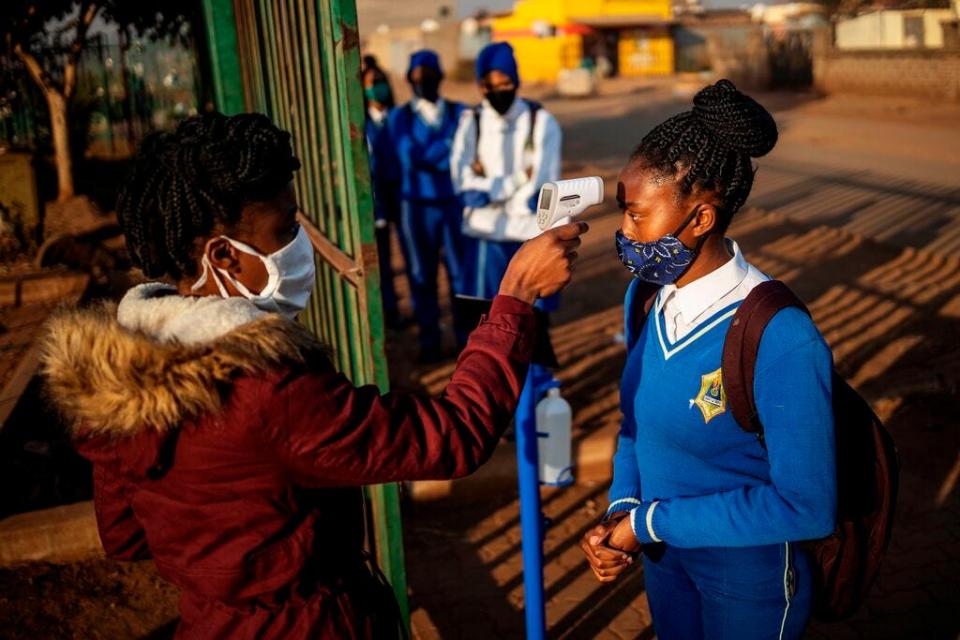To defeat COVID, bring America's full power to the international fight: Albright & Hadley
With its staggering human toll, the COVID-19 pandemic already constitutes one of the greatest challenges America has ever faced. It is also a reminder to all Americans that what happens in far off corners of the world directly impacts their lives and livelihoods.
In the 20th century, we learned that two massive oceans were not enough to keep distant conflicts from coming to our shores. In the 21st century, we have learned that we cannot rely on geography to protect us from borderless threats such as pandemic disease, terrorism and the impacts of climate change.
During these months of turmoil, U.S. leaders have been rightly focused on the economic and health crisis within our borders. But regardless of how successful we are at fighting this threat here at home, we will never achieve victory unless we are also fighting it around the world. Nor will we succeed without support from leaders of both parties and partnership between both ends of Pennsylvania Avenue.
To confront this challenge, we must bring the full scale of American power to the global fight against COVID-19. As we navigate this crisis, there are three areas of our international response that deserve particular attention and bipartisan support:
Resources are key
►First, we must provide resources to support the international response in any new emergency funding from Congress. Less than 0.1% of the emergency COVID-19 supplementals have been dedicated to the international response. As we continue to confront the impact of the virus here at home, now is the moment to step up our international efforts, particularly as the urgency in low-income countries increases and countries in Latin America and Africa are seeing case numbers increase far faster than the global rate.

As part of our international response, we must drive more reform and accountability at the World Health Organization. But it is a mistake to halt U.S. funding and end our relationship with the WHO, given its unique capabilities to support weak and fragile health systems in the developing world. We were pleased to see lawmakers on both sides of the aisle speak up on why the WHO is an essential player in the midst of a pandemic.
Assisting conflict-ridden areas
►Second, as members of the U.S. Institute of Peace’s Task Force on Extremism in Fragile States, we are deeply worried about the long-term impact of COVID-19 on conflict-affected areas around the world. Without bold, ambitious action and new resources for the international response, experts from the International Rescue Committee estimate that the world could see up to 1 billion COVID-19 infections and over 3 million deaths in 34 conflict-affected and fragile countries. There is no question that that level of infection will quickly find its way back to our shores.
GOP leader Kevin McCarthy: Prioritize COVID aid for child care and schools to help parents and the economy
The virus is already unleashing new disruptions in some of the world’s toughest environments. Experts have seen violent attacks spike by double-digit percentages in sub-Saharan Africa, and the World Food Program recently warned that up to 300,000 people could starve to death every day if COVID-19 disrupts global food supply chains. The chaos and havoc on everything from forced displacement to food security will create troubling voids for nonstate actors and extremist groups to increase their foothold.
Tackle conflicts, spread democracy
Last year, Congress passed the Global Fragility Act to help drive a coordinated and new whole-of-government approach to prevent conflict and reduce state fragility. This effort has never been more important. As we confront the crisis at home, we believe we must also simultaneously tackle the underlying drivers of conflict and fragility around the world with new rigor as we combat the global health crisis — otherwise, we will find new long-term risks for America’s interests and our allies that could far outlast the virus.
►Third, even as we face growing challenges at home, we cannot ignore how authoritarian states are already seeking to use the virus to amplify their influence around the world. Supporting democracy and good governance will be an essential tool as we build new coalitions country by country to contain the spread of COVID-19.
Through the power of our diplomacy and our engagement, we must push back on attempts by some to leverage the pandemic to consolidate power, promote disinformation and stifle dissent. It is incumbent on all of us to demonstrate how democracy and a robust civil society are critical for the long-term success against this pandemic — and the next one.
No longer the gold standard: Florida's COVID-19 data is unreliable, confusing and hazardous to our health
The truth is that the stakes are immeasurably high for America and the world to get this right. This once-in-a-century moment demands nothing less.
Madeleine Albright was secretary of State in the Clinton administration. Follow her on Twitter: @madeleine. Stephen Hadley was national security adviser in the George W. Bush administration.
You can read diverse opinions from our Board of Contributors and other writers on the Opinion front page, on Twitter @usatodayopinion and in our daily Opinion newsletter. To respond to a column, submit a comment to letters@usatoday.com.
This article originally appeared on USA TODAY: Bring full US power and resources to the global fight against COVID-19

